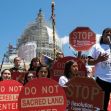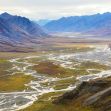Alaskan native tribes are among several groups that have filed a lawsuit against the Trump administration in regard to the protection of Alaska's Tongass National Forest.
In late October, the Trump administration rolled back protections for the Tongass National Forest by exempting parts of it from the protections provided under the Roadless Area Conservation Rule. The Roadless Rule protects about a third of American National Forests from being tampered with through the construction of new roads or clear-cut logging. Before the protections were rolled back, the Tongass had been protected for nearly two decades.
This new rollback in protections of the Tongass has made nine million acres in the area vulnerable to clear-cut logging. Because of the Roadless Rule, much of the wilderness in America has remained undisturbed, and tourism along with natural recreational activities have flourished.
The lawsuit, which was initiated by the nonprofit environmentalist group EarthJustice and the Natural Resource Defense Council, represents Alaska Native Tribes including the Organized Village of Kake, the Organized Village of Saxman, the Hoonah Indian Association, the Klawock Cooperative Association, and the Ketchikan Indian Community. Along with the native tribes, several local businesses have joined in on the lawsuit as the rollbacks in protections will hurt the more than 12,000 jobs and $500 million annual economic contributions provided by the Tongass. Additionally, the lawsuit will also represent a little over a dozen conservation groups that argue that the Tongass must remain protected.
Dan Blanchard, the CEO of UnCruise, a small vessel company that offers recreational activities in the area, is in support of reversing the rollbacks. Blanchard explains, “Southeast Alaska hosts two-thirds of all Alaska visitors, making it the most visited region of the state. Forest Service lands, particularly inventoried Roadless areas, are critical to drawing these visitors, and generate roughly $245 million annually - over two-thirds of Tongass National Forest visitor spending. We depend on the ability to market and provide unique recreation experiences, and our clients expect to see ‘wild’ Alaska and prefer intact natural landscapes. Clearcutting and timber road construction would force us to divert our travel routes to avoid seeing or being around clear cuts. This would negatively affect the outdoor recreation economy and Southeast Alaska’s reputation as an adventure travel destination.”
In a statement shared by Kate Glover, a lawyer for EarthJustice, Glover argues, “The Trump’s administration’s ignored input from tribes and the impact on tribes who rely on the Tongass for hunting, gathering, and fishing. It ignored the impact on fishermen, the tourist industry, and the impact on the climate for the whole world.” Glover adds, “Essentially, the decision did not make sense, it was arbitrary.”
On behalf of the Alaska Native Tribes, Joel Jackson, the Tribal President of the Organized Village of Kake, emphasized the importance of the region for native culture by sharing, “We are deeply concerned about the protection of the Tongass National Forest, where our ancestors have lived for 10,000 years or more. Our way of life depends on it.”
In defense of the amended protections, the Trump administration has argued that the jobs created from the logging industry would benefit the area without impacting the wildlife, fishing industry, or tourism in the Tongass. However, there are reports that the administration's own analysis shows that logging in the area will not generate new jobs or income that would depict a meaningful benefit.
There is also speculation that the rollbacks are an attempt to appease the timber industry which many conservatives argue will not be sustainable. After a meeting with Alaska Governor Mike Dunlevy aboard an Air Force One flight, the President announced the new rollback, drawing further speculation on what the true reason for the cutting back on protections is.
History of the Tongass National Forest
The Tongass National Forest is a sprawling 17 million-acre temperate rainforest that covers about 90% of the southeast panhandle of Alaska. Environmentalist groups, including Alaska native tribes, stand firm that the area is the traditional homeland for many Alaska native tribes and indigenous communities in southern Alaska. These communities not only depend on the area for food sourcing, but they are deeply connected to the cultural traditions the region provides.
On an economic scale, the area is estimated to produce about 25% of the West Coast salmon. The fishing industry here is a key component of Alaska's economy, according to the U.S. Forest Service. Additionally, the ecosystem of the Tongass is home to a wide variety of wildlife that could be impacted by the protection rollbacks.
EarthJustice also argues that the area is a key player in helping to fight against climate change as the area absorbs around 8% of greenhouse gas emissions emitted from mainland U.S. Another study conducted in 2019 found that the area was responsible for absorbing more carbon emissions than any other National Forest.






